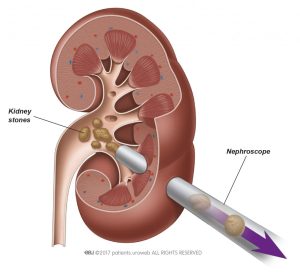This procedure has been performed on many patients over the past several years and is the standard of care for patients with large, very hard kidney stones or resistant to other forms of stone treatment. In this way, open surgery for kidney stones has been replaced in the vast majority of patients.
What to expect during PCNL renal preoperative consultation?
At the initial preoperative consultation for renal PCNL, it is important for patients to provide all X-ray films (eg, KUB, CT scan, MRI, ultrasound) and reports to their surgeon for review.
The surgeon reviews the patient’s medical history and performs a brief physical examination. After the initial visit, a urine test will also be done.
In the next step, all treatment options at this time will be discussed, as well as the risks and benefits of each treatment. If your surgeon determines that you are a good candidate for kidney PCNL, you will consult with the surgeon to schedule your procedure.
Preparation for renal PCNL
Before performing the PCNL surgery, it is necessary to perform the following measures:
What tests should be done before surgery?
Once your surgery date is set by a surgeon, the following items will be requested based on your age, medical history, and risk of surgery if necessary. These things are done in the initial and subsequent visits:
physical examination
EKG (electrocardiogram)
CBC (complete blood count)
PT/PTT (Blood Coagulation Tests)
Urine test and urine culture
Medicines that you should avoid before kidney PCNL
Below is a list of medications that you should avoid at least 7 to 10 days before PCNL kidney surgery. Aspirin, Motrin, Ibuprofen, Advil, Alka Seltzer, Vitamin E, Ticlid, Coumadin, Lovenox, Celebrex, Voltaren, Vioxx, Plavix are among these drugs.

Many of these drugs can change the function of platelets or your body’s ability to clot, and therefore may contribute to unwanted bleeding during PCNL kidney surgery.
If you are unsure which medications to stop before surgery, call your surgeon’s office. Do not discontinue any medication without contacting the prescribing physician and obtaining approval.
How long does kidney stone surgery take?
Typically, the PCNL procedure takes one to two hours. PCNL is performed by making a small 1 cm incision in the patient’s side. In kidney stone surgery, a tube is placed through an incision into the kidney under X-ray guidance.
A small telescope is then passed through the tube to reveal the stone, break it up, and remove it from the body. In the practice of PCNL, if necessary, a laser or another device called a lithotripter can be used to break the stone before removing it.
How long does kidney stone surgery take?
Compared to open stone surgery, PCNL leads to a significant reduction in postoperative pain, a shorter hospital stay, and an earlier return to work and daily activities.
Also, kidney stone operation has a higher success rate for clearing all stones in one operation than other methods such as extracorporeal shock wave lithotripsy (ESWL), which often requires several attempts and repetitions.
